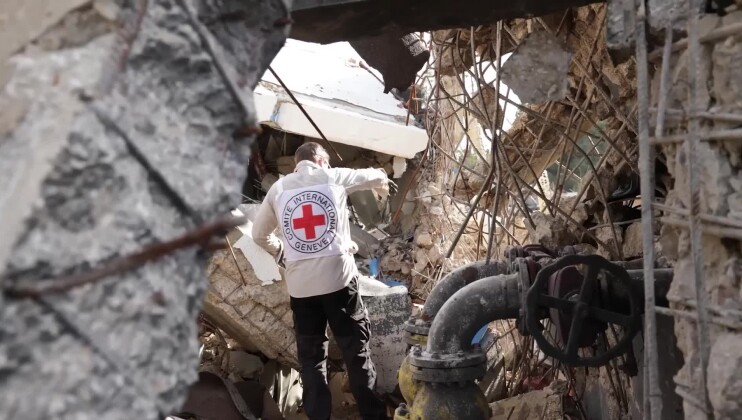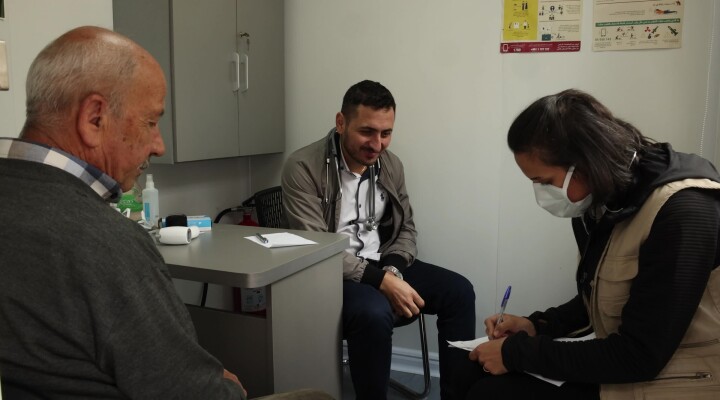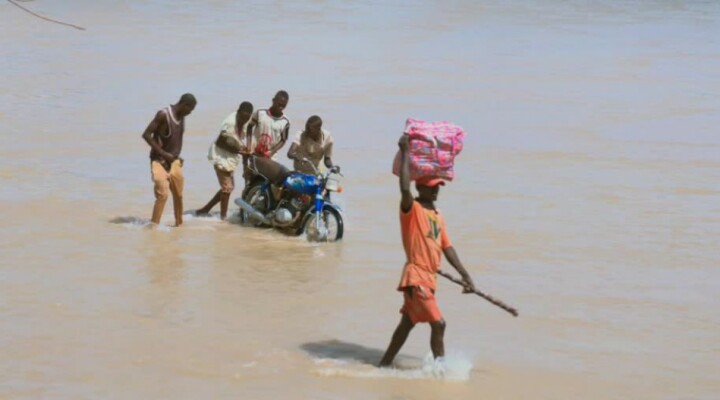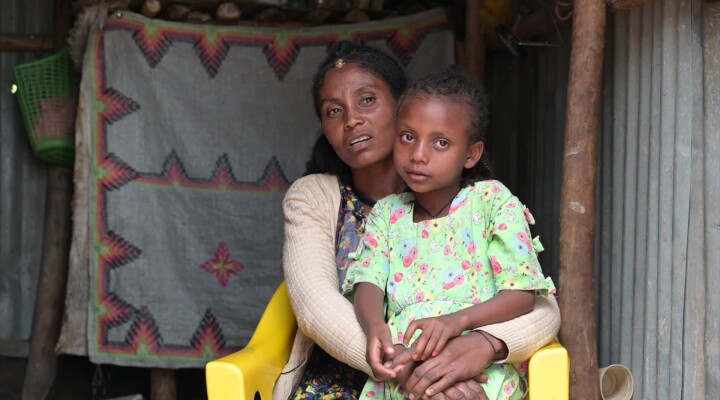Yemen: Conflict and climate crises push farmers to the breaking point
With three out of four Yemenis relying on agriculture and livestock for their survival, the climate crisis is pushing communities already reeling from almost eight years of conflict to the breaking point. Yemeni farmers have seen their livelihoods destroyed by extreme drought, devastating flooding and grinding conflict, making it harder for them to make ends meet.
Mohammed, a farmer from Dhamar governorate, embodies the struggle of so many Yemeni farmers today. The heavy rainfall came and reduced his home to a pile of rubble. “Floods took our farms and our homes,” he said. “I feel like life is over. I don’t have land or a house anymore. It’s all over.”
Flooding in recent months has had a devastating impact on the agricultural sector, destroying crops and moving explosive remnants of war to agricultural areas. With Yemen facing a devastating food security crisis, this will only further exacerbate an already alarming situation. Today approximately 19 million people in Yemen are unable to meet their daily food needs countrywide, compared to 16.2 million last year. That’s about 63% of the total population, up from 53% last year.
The climate crisis and conflict are also forcing more families to abandon their homes. Over 3.3 million people in Yemen are estimated to be displaced from their homes today. It is not uncommon for people to flee their homes seeking safety from conflict to then leave again because the ground cannot be farmed. In some areas, unexploded ordnances lurk in what should be farmland, making it dangerous for people to tend to their land. Water scarcity across Yemen, exacerbated by the protracted conflict and several years of droughts, has limited access to safe water for 17.8 million people. As a result, an increasing number of farmers are being forced to abandon their profession.
“This now empty dam used to nourish our land. The consecutive dry seasons badly harmed farmers,” said Yasser, from Abyan, Yemen. “Many farmers had to leave their jobs and look for other jobs, as cultivating the land is no longer enough to sustain basic needs of the families.”
The ICRC works in close collaboration with Yemen Red Crescent Society to support the most vulnerable rural communities to sustain their livelihoods. For example, in 2021, more than 112,500 livestock keepers benefited from livestock vaccination and treatment campaigns, while in 2022 thousands of farmers have benefitted from multi-purpose cash grants, micro-economic initiative projects or coffee or wheat seed donations.
Yemen, like many conflict-affected countries, is disproportionately impacted by climate change. The ICRC is calling for greater support to help people cope with and adapt to climate change in countries like Yemen.
For more information, please contact:
Ali Daoudi (Sana’a) adaoudi@icrc.org +967 737889476
Imene Trabelsi (Beirut) itrabelsi@icrc.org +961 3 138 353
Jason Straziuso (Geneva) jstraziuso@icrc.org +41227302077
Notes for editors:
The ICRC aims to continue to rely on sustainable and environmentally friendly energy through its humanitarian interventions in different regions around the country. For example, the ICRC recently installed a solar-powered water-pumping system to improve access to clean water for 36,000 people in Mabyan District, Hajjah Governorate.
ICRC in Yemen: livelihood support
- In 2021, the ICRC provided various forms of relief support, including food, unconditional cash grants, basic household items and aid with agricultural and animal products to more than 1,603,605 people. This was done in coordination with the Yemen Red Crescent Society and the local communities. Also, in 2021, more than 112,500 livestock keepers benefited from the ICRC-supported vaccine campaigns.
- In 2021, more than 3,700 beekeepers and farmers benefited from ICRC beekeeping projects and Agroalimentary support in different parts of the country.
- In 2022, the ICRC is planning to continue support beekeepers through training and financial support.
- The ICRC is supporting sustainable income-generating activities, such as beekeeping, to empower Yemeni people and help them to be more independent in the long run.
Log-list
Title : Yemen
Location : Abyan/Dhamer/Lahij/Marib
Length : 6 mns
Producer : ICRC / Wagdi Almaqtiri
Production languages : Arabic/ English
Filming dates : 2022.8.2 Abyan / 2022.9.4 Dhamar/ 2022.10.30 Lahij / 2022.11.3 Marib
Copyright : ICRC access all
Shortlist /Script:
00:00-00:30 Broll Drone footage of farming areas in Lahij
00:30-01.09 External Broll, Houses destroyed by rainfall in Lahij
01:10 -01.30 Soundbite: Saif Saleh, Al-Hawta, Lahij
Lahij was a green land, famously known for that.
It was well-known for its beauty, its fertile lands, variety of fruits and vegetables cultivated here, but now we are in a crisis as the wells have drained and rivers have dried up
01:31-01.41 I am now 76 years old, and I have never witnessed such heat .The temperatures are so high today.
01:42 -01.59 We are at war now. We move from one place to another, and now after 5 years, I came back to my house which I have abandoned and now my house has suffered from heavy rains, and my living in it is a hazard.
02.00-02.02 -The Homes of so many of the people of Al-Hawta area were destroyed due to floods
02.03-02.09 B roll external Footage in the village of AlKherbeh, in Jahran, Dhamar showing farms flooded with rainwater and destroyed crops
02.10-03.39 B roll external Footage for the destruction of the villager’s houses and lands
02.40-02.49 Soundbite: Ahmed Aydha, AlKherbeh village, Dhamar
Floods are something we have never known before in our lives. I am already an old man, and I have never known floods in this area throughout my entire life. It is so heavy and powerful
02.50- 03.02 From the heaviness of the floods and rain, the potatoes, onions, and tomatoes perished, and all the vegetation in this area drowned
03.03-03.13 Soundbite: Mohammed Ahmed, AlKherbeh village, Dhamar
With the heat and floods that affected the area we lost everything
Floods took our farms and our homes
I feel like life is over. I don’t have land or a house anymore. It’s all over.
03.14- 03.39 B roll Various shots of a famous dam " Wajer dam" in Abyan after it completely dried up for the first time in decades
03.40-04.07 Soundbite: Yasser Saleh, Abyan
This area used to benefit greatly from the water dams,
This now empty dam used to nourish our land. The consecutive dry seasons badly harmed farmers
Many farmers had to leave their jobs and look for other jobs, as cultivating the land is no longer enough to sustain basic needs of the families.
4:07-04.15 Farmers were forced to change their agricultural profession to other professions
0416-04.25 They had to leave their farms, and lands, and to move to areas seeking to earn a livelihood in areas abandoning farming which was their main trade
04.25-5.29 Broll external Footage of farmland surrounded by dissertation in Marib
05.30- 05.52 Soundbite: Salem Hassan, Marib
The war affected us a lot, mainly through the cutting of roads, and it also caused prices to rise, especially seeds, this led to increased desertification on farmlands and farmers keep trying to resist it.
05.52-06.00 Many farmers left their farms due to desertification and they fled to other areas



